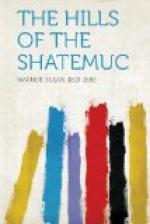It was necessary to stuff cotton into his ears. Fancy had obstinately a mind to bring his mother’s gentle tread about him, and to ring the sweet tones of home, and to shew him pictures of the summer light on the hills, and of the little snow-spread valley of winter. Nay, by the side of that cold fireplace, with Mr. Glanbally at one corner and himself at the other, she set the bright hearth of home, girdled with warm hearts and hands; a sad break in them now for his being away. Mr. Glanbally had returned to his book and was turning over the leaves of it with his nose; and Winthrop was left alone to his contemplations. How alone the turning over of those leaves did make him feel. If Mr. Glanbally would have held up his head and used his fingers, like a Christian man, it would not have been so dreary; but that nose said emphatically, “You never saw me before.”
It was a help to him when somebody came in to spread that bare table with supper. Fried pork, and cheese; and bread that was not his mother’s sweet baking, and tea that was very “herbaceous.” It was the fare he must expect up the mountain. He did not mind that. He would have lived on bread and water. The company were not fellow-travellers either, to judge by their looks. No matter for that; he did not want company. He would sing, “My mind to me a kingdom is;” but the kingdom had to be conquered first; enough to do. He was thinking all supper-time what waste ground it was. And after supper he was taken to his very spare room. It was doubtful how the epithet could possibly have been better deserved. That mattered not; the temple of Learning should cover his head by and by; it signified little what shelter it took in the mean while. But though he cared nothing for each of these things separately, they all together told him he was a traveller; and Winthrop’s heart owned itself overcome, whatever his head said to it.
His was not a head to be ashamed of his heart; and it was with no self-reproach that he let tears come, and then wiped them away. He slept at last; and the sleep of a tired man should be sweet. But “as he slept he dreamed.” He fell to his journeyings again. He thought himself back on the wearisome road he had come that day, and it seemed that night and darkness overtook him; such night that his way was lost. And he was sitting by the roadside, with his little bundle, stayed that he could not go on, when his mother suddenly came, with a light, and offered to lead him forward. But the way by which she would lead him was not one he had ever travelled, for the dream ended there. He awoke and knew it was a dream; yet somewhat in the sweet image, or in the thoughts and associations it brought back, touched him strangely; and he wept upon his pillow with the convulsive weeping of a little child. And prayed, that night, for the first time in his life, that in the journey before him his mother’s God might be his God. He slept at last.




